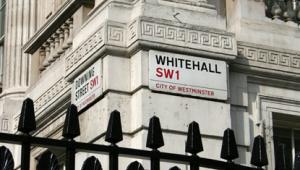10 June 2005
The leader of Whitehall's latest professional body this week outlined his ambitious plan to improve working conditions for health sector managers, calling for talks with ministers over pay, pensions and NHS reforms.
Jon Restell, chief executive of Managers in Partnership, an NHS management organisation launched jointly by the FDA and Unison unions on June 6, told Public Finance that he would target three key areas for improvement in managers' conditions over the next 12 months.
'We've got to be responsive to the government's third-term agenda. It'll come as no surprise that the most crucial areas are likely to be pay, pensions and the continued restructuring of the NHS, including Agenda for Change,' he said.
'At NHS board level, our members will see new pay and conditions for senior managers introduced, and we want to engage with NHS bodies and the government on that, so that we achieve a higher level of accountability for those deals.'
Restell added that there was also work to do around the NHS's restructuring and consolidation plan, including changes at board level for strategic health authorities and primary care trust reconfiguration.
'My feeling is that these reforms have not necessarily been handled very well so far and we want to ensure, for example, that senior staff are offered new employment if they are deemed surplus to requirements.'
MIP will also push hard for clearer guidance on the impact of the NHS's Agenda for Change programme on management staff at or above civil service grades 8 and 9, he added.
MIP has been four years in the making and will start life with 4,000 members. It combines Unison's huge health sector reach with the FDA's policy influencing skills.
Restell said the organisation would work to dispel the myth that management staff are 'pointless bureaucrats' who contribute to NHS waste.
Steve Barnett, director of NHS Employers, one organisation MiP will attempt to influence, said: 'Managers are a vital part of the NHS and it's important that they can get access to strong representation in the same way that other health workers can.'
Call to continue Risk Programme
A senior MP has called on ministers to extend a successful risk management programme across Whitehall, amid concerns that only a quarter of departments understand the level of risk attached to new projects.
Edward Leigh, Conservative MP and chair of the influential Commons' Public Accounts Committee in the last parliament, wants the Treasury to continue its Risk Programme to ensure 'risk management becomes an integral feature of the way public services are delivered and managed'.
The government backed the two-year RP in 2002 after Number 10's Strategy Unit and the Treasury raised concerns that too many government projects were undertaken without full risk management analysis, leading to cost escalations, late and weak service delivery and inadequate management practices.
Leigh cites the foot and mouth outbreak among livestock in 2001, which cost taxpayers £3bn, as an example of how a poor understanding of risk causes problems.
The RP was seen as a vital part of Prime Minister Tony Blair's plan to reform public services and has helped senior Whitehall staff to improve their understanding of the subject. Funding has now expired, but Leigh believes it should be extended because recent investigations by the PAC and National Audit Office have revealed continuing problems across some departments.
A PAC report published on June 7 said: 'There are a number of areas where departments still need to do more', including the identification of risks involved in new projects.
Government under fire from GMB as consultants' bill totals £1.4bn
The government spends enough on private sector advice to hire 27,000 consultants, research says.
A study published this week by the GMB union, which represents 200,000 public sector staff, estimates that the government spent more than £1.4bn on consultants in 2003/04, a rise of almost £500m on the previous year. GMB researchers calculated that this would have paid for 27,093 advisers to Whitehall departments.
While the government is forced to use external advisers for some specialist work, several Whitehall officials and MPs have questioned the use of consultants for projects that could be undertaken by civil servants.
Paul Kenny, GMB acting general secretary, said: 'The taxpayer is paying too much for management and consultancy advice.
'There is scope to save money… and to spend it instead on frontline services.'
He blamed Whitehall's 'culture of continual reorganisation' for creating a 'field day' for consultants.
The Department for Work and Pensions topped Whitehall's spending list, paying out £307m on external advice. The Highways Agency (£277m), Ministry of Defence (£251m) and Department for International Development (£213m) also spent large sums.
PFjun2005




















